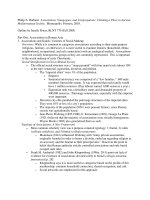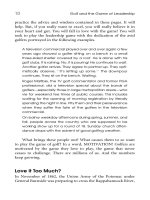Tài liệu Golf and the game of leadership 7 ppt
Bạn đang xem bản rút gọn của tài liệu. Xem và tải ngay bản đầy đủ của tài liệu tại đây (236.13 KB, 10 trang )
50
Golf and the Game of Leadership
5. Treat people as adults.
6. Trust first and be trustworthy.
7. Read to lead and walk-the-talk.
8. Listen, listen, listen and then ask one more question.
9. Intuitively generate adaptive change.
10. Go to their kid’s ball games!
How does this list compare to your rules for the game of
leadership? What is your code of conduct? What guides your lead-
ership actions? Are you approaching the game of leadership with
the same integrity as you approach the game of golf? Just as in the
game of golf, only you know your real score!
The Guy in the Glass
Peter ‘‘Dale’’ Wimbrow, Sr. wrote the poem The Guy in the Glass
in 1934. It was published in the American Magazine at that time.
Over the years the poem has appeared under incorrect titles, such
as ‘‘The Man in the Glass,’’ or ‘‘The Face in the Glass.’’ Since it
was written, the poem has taken on a life of its own and is often
followed by the notation, ‘‘author unknown.’’ Some people have
even assigned their name to the poem and misquoted the original.
Sallydale Wimbrow and Peter Dale Wimbrow, Jr. established
a computer Web site in 1997, ‘‘The Official Guy in the Glass Web
Page.’’ They did so because they are immensely proud of their
father’s work and wanted to, in their words, ‘‘set the record
straight and to provide the poem as it was actually written for any
and all to use as our father’s gift to the world. . . . He would have
wanted his work to be a gift and so do we. All we ask is that
you properly credit him somewhere in your publication as the
author.’’
Here is the original poem and its clear message. Incidentally,
a word in the poem most often changed is ‘‘pelf,’’ which appears
in the first line. ‘‘Self’’ is substituted. But for those of us who
pursue careers in business, pelf is a most appropriate word. You
10589$ $CH4 02-23-04 16:44:33 PS
51
Play by the Rules
probably don’t need to look it up, but if you are stumped, as I
was, ‘‘pelf’’ means ‘‘money or wealth.’’
The Guy in the Glass
When you get what you want in your struggle for pelf,
And the world makes you ‘‘King for a Day,’’
Then go to the mirror and look at yourself,
And see what that guy has to say.
For it isn’t your Father or Mother or Wife
Who judgment upon you must pass,
The feller whose verdict counts most in your life
Is the guy staring back from the glass.
He’s the feller to please, never mind the rest,
For he’s with you clear up to the end;
And you’ve passed your most dangerous, difficult test
If the guy in the glass is your friend.
You may be like Jack Horner and ‘‘chisel’’ a plum,
And think you’re a wonderful guy,
But the man in the glass says you’re only a bum
If you can’t look him straight in the eye.
You can fool the whole world down the pathway of years,
And get pats on the back as you pass,
But your final reward will be heartache and tears,
If you’ve cheated the guy in the glass.
5
Quick Tips for Improving Your Leadership
Game
Real leaders typically understand and model the following in their
day-to-day actions:
■
Nice gals and guys do not finish last!
■
Tell the truth, then you don’t have to remember anything.
■
Always do what you say you are going to do and you will
be respected.
10589$ $CH4 02-23-04 16:44:34 PS
5
5
Tee It Up with Vision
Vision without action is merely a dream. Action without
vision just passes the time. Vision with action can
change the world.
1
Joel Barker, The Power of Vision (video)
Bob Frosch came to General Motors from NASA in the late 1980s
to become the first technical head in its history to be hired from
outside the corporation. His title was vice president, GM Research
Laboratories. Bob enjoyed telling the following story:
One evening in the late 1960s, as Frosch was walking through
one of NASA’s buildings on his way to the parking lot, he came
upon a janitor sweeping in the aisles. The janitor was whistling a
happy tune as he pushed his broom. Bob greeted him:
‘‘Hi, how’re you doing?’’
‘‘Doing great. And you, sir?’’
52
10589$ $CH5 02-23-04 16:44:38 PS
53
Tee It Up with Vision
‘‘Just fine. You seem to be enjoying your work.’’
‘‘Oh, you bet’’ replied the janitor, ‘‘I love my job.’’
‘‘Well, that’s terrific,’’ said Bob, ‘‘what are you going to be
doing tonight?’’
‘‘Helping put a man on the moon, sir, helping put a man
on the moon.’’
The janitor knew specifically what NASA’s vision was at the
time and clearly it was inspiring to him. Visions are supposed to
provide direction and inspiration.
A Brief Exercise
It is obvious that I cannot see you. Nonetheless, I have a request
that shows my trust in you. I think you will find the following
brief exercise interesting and beneficial.
Please do this exercise before reading the paragraphs follow-
ing this one. I’m going to ask you to close your eyes for about sixty
seconds while visualizing your favorite vacation spot. Go there in
your mind’s-eye. See yourself doing the things you enjoy doing
with the people you know and love. Easy enough? Okay, close
your eyes for about sixty seconds and visit your favorite vacation
place!
Ah, you’re back, safe and sound. If you fell asleep, now that
you are rested, go back to the previous paragraph and try again!
If you succeeded with your visualization, I am certain you enjoyed
it. Here are a couple of questions for you:
1. Did you have any trouble visualizing your favorite vacation
spot?
2. Could you see yourself there, doing the things you like to
do, with the people you enjoy most?
3. Did you have a clear black-and-white picture?
People invariably say no to number 1, yes to number 2, and
for number 3 they adamantly declare NO, it was in Technicolor!
How about you?
10589$ $CH5 02-23-04 16:44:38 PS
54
Golf and the Game of Leadership
The foregoing simple visualization exercise illustrates the clar-
ity and power of positive mental images.
Focusing back on your leadership role, here are a few more
questions for you:
1. Is your organization’s vision clear to you? Is it in black-
and white or Technicolor?
2. Is your vision of your leadership role in support of the
organization’s vision clear to you? Black-and-white or
Technicolor?
3. Have you delivered your and the organization’s vision to
those for whom you are responsible as a leader? Yes or no?
If yes, do they see it in black-and-white or Technicolor?
4. Finally, do you have a vision for yourself and your future
in the game of leadership, much as Woods, Sorenstam, and
the other stars of the sport have for their future in the
game of golf?
Leadership Is Poetry
Leadership is more than technique, though techniques are neces-
sary. In a sense, management is prose; leadership is poetry. The
leader necessarily deals to a large extent in symbols, in images,
and in the sort of galvanizing idea that becomes a force of history.
People are persuaded by reason, but moved by emotion; the leader
must both persuade them and move them. The administrator
thinks of yesterday and today. The manager thinks of yesterday,
today, and tomorrow. The leader thinks of yesterday, today, and
tomorrow but focuses on the day after tomorrow.
It is not enough for the leader to know the right thing. The
leader must also be able to do the right thing. The would-be leader
without the judgment or perception to make the right decisions
fails for lack of vision. The one who knows the right thing but
cannot achieve it is ineffectual and fails. Vision is not restricted to
the leaders at the top of the organization. It’s a requirement for
success at every level, not only in your vocational life, but in your
10589$ $CH5 02-23-04 16:44:38 PS
55
Tee It Up with Vision
private life as well. The old cliche
´
is so true, ‘‘If you don’t know
where you are going, any road will get you there.’’
Vision or Mission
Vision statements are sometimes confused with mission state-
ments. Let me end the confusion for you. A ‘‘vision statement’’ is
what causes you to go to sleep at night with a smile on your face.
A ‘‘mission statement’’ causes you to get up in the morning and
work at attaining the vision.
We talked about values at hole ࠻2. Vision statements are
value statements, and together with mission statements they can
provide clear over-arching direction to your activities as a leader.
The mission statements can help you and your people to focus on
the part of the vision that you can impact. My favorite mission
statement is one used by a Canadian marketing organization,
‘‘Easy to buy, a pleasure to own.’’ I don’t see where there would
be too many questions regarding what is meant by that? And,
more importantly, it clearly and concisely tells the members of
the marketing staff what their responsibility is to the customer.
Connecting Vision and Values to the
Bottom Line
Senior leaders have a broad view of the organization’s strategy.
The front-line workers know a lot of detail about their specific
assignments and are at the pay point of the organization’s activi-
ties. It is the job of the ‘‘leaders in the middle’’ to knit these two
elements together.
Organizational vision and values are established by the top of
the organization. They are translated into systems and structures
that are intended to guide the organization’s efforts in the direc-
tion of the vision and in a manner compatible with the values.
These systems and structures can be well articulated and clearly
understood, and are expected to be practiced and followed by
everyone. Or, they can get distorted and take the organization off
track.
10589$ $CH5 02-23-04 16:44:39 PS
56
Golf and the Game of Leadership
The behaviors thus inspired dictate the daily decisions made
and the consequent success or failure in achieving the vision. Fig-
ure 5-1 illustrates the connection of vision and values to the bot-
tom line.
President John F. Kennedy expressed the vision of putting a
man on the moon. One of his reasons was to reinvigorate the
value of being an American. The systems and structure of NASA
together with the daily decisions of all the people involved in the
vision brought success. Most Americans alive at the time heard
Neil Armstrong’s historic communication from the moon to mis-
sion control Houston as the vision was achieved. That adventure
perfectly illustrates the power of a vision to inspire people to do
the seemingly impossible.
The Visualization Process
Visualization with action can lead to achievement in space, on the
golf course, and in the game of leadership. There are at least four
FIGURE 5-1.
Vision links top-line values to the bottom line.
Vision
Values
Systems and
Structures
Daily
Decisions
10589$ $CH5 02-23-04 16:44:40 PS
57
Tee It Up with Vision
points to keep in mind with regard to your process of visualiza-
tion:
1. First, visualize yourself succeeding and what success will
look like for you. For example, do you see yourself as a concert
pianist, a skilled cabinet maker, a licensed physical therapist, a
professional golfer, or a respected leader?
2. Next, visualize the benefits that will flow from being suc-
cessful in achieving your vision. What benefits are important to
you? Are they professional recognition, helping others succeed,
money, status, security for yourself and your family, etc.?
3. Your visualization will need to be sustained over time. Its
sustaining power can come from continuing affirmations. You
will need to ‘‘talk to yourself’’ and talk in the present tense, as in
‘‘I practice everyday’’ instead of ‘‘I will practice everyday.’’ For
example, I became interested in running for exercise long before
it became a fitness rage. My colleagues were not into exercise.
They were constantly asking whether I was still doing that running
thing. I made it a point, for my affirmation and motivation, to
respond in the following fashion. ‘‘I ran three miles this morning.
It was great and I’ll be running again tomorrow morning. I’ll take
the weekend off and be back at it again on Monday morning. You
should try it.’’ I ran for years until my knees said, ‘‘no more.’’ I
still miss it, but now I walk the dog.
4. Visions are rarely fulfilled in one dramatic moment but
rather only after reaching a series of attainable goals. Neil Arm-
strong did not reach the moon in a single launch. Rather a whole
series of space experiments provided the knowledge, experience,
and equipment necessary for the moon landing. Similarly, Tiger
Woods did not win the four major professional championships—
the Masters, U.S. Open, British Open, and PGA Championship—
all at once. He had to visualize winning each in its own time. In
the process, he did what no other golfer has been able to do, which
is to hold all four major titles at the same time. I don’t know
whether Tiger envisioned the ‘‘Tiger Slam,’’ but I imagine he did.
I do know he won them one at a time. And I believe that he has
10589$ $CH5 02-23-04 16:44:41 PS
58
Golf and the Game of Leadership
both a visualization to be the greatest golfer ever to play the game
and a series of goals he sees as necessary affirmations along the
way.
If you have committed to being a leader, a real leader, you
first need to visualize what kind of leader you want to be. Only
then can you begin thinking about what you need and want to do
to reach your goal.
Joel Barker, in his excellent video, The Power of Vision, pre-
sents research that young people of lesser intelligence who have a
vision of what it is they want to accomplish tend to outperform
those who have greater intelligence but no clear direction. A clear
vision of a goal sets a positive and comfortable stage for our ac-
tions regardless of our age. As Aristotle said, ‘‘The soul never
thinks without a picture.’’
According to Dr. Deborah Graham, who works with over 200
PGA, LPGA, Champions, and Buy.com Tour players on the men-
tal approach to the game:
In golf, your objective on the first tee, as with all other shots,
should be to keep your body relaxed, your mind quiet, and
your focus narrow so that you will have the best chance to use
your skills. The quality of your mental routine (your commit-
ment to your shot, your image of what you want the ball to
do and your feel for the tempo you want) will strongly influ-
ence the quality of your shot.
2
And so it is with leadership and your actions as leader.
Organization Vision: Clear to Everyone?
Leaders too often fail to make the organization vision clear to
everyone and, worse, send very clear messages that establish a
wrong direction for individual action.
In one U.S. Army unit stationed in Germany, little effort was
given to identifying the unit’s mission and how it fit into the
Army’s overall vision and values. Few seemed to know exactly
10589$ $CH5 02-23-04 16:44:41 PS
59
Tee It Up with Vision
why they were assigned in Germany or what it was they needed to
accomplish. The rank-and-file troops were not aware of how their
individual performance affected unit performance. They simply
responded to the pressures of the last order received.
A tank driver in that unit was experiencing bad radio commu-
nications. The reason for the difficulty was that his tank radio
antenna was corroded and bent. He had a good antenna stored
away in his tank but he was saving it! He was saving it for the
next company commander inspection, because he had once been
chewed out at inspection for having a corroded antenna. He had
‘‘learned’’ that clean equipment for inspections was more impor-
tant than good communications on the battlefield.
Another example involves a railroad switching yard. Switch-
ing yards are busy places and can be dangerous. At that time,
the switching yard controls were located in a glassed-in booth
overlooking the yard. The operator was a long-service employee.
His job was critical in maintaining safe conditions in the yard.
Safety is the number one concern in any workplace, and it was
certainly part of the vision management held for operation of the
switching yard.
One warm, sunny day, a consultant, hired by management to
review the railroad’s operations, climbed to the top of the switch-
ing yard tower to talk with the tower operator. As he entered the
operator’s booth, he observed the operator straining on one of the
brakes used to control switching operations. The brake shud-
dered, seemed to slip, then grabbed, after which the operator re-
leased his grip on it. Perspiration dripped from the operator’s
face. The consultant said:
‘‘Wow, that looked tough. Is that brake supposed to work
like that?’’
‘‘Of course not. The pads are worn and one of these days
it’s going to fail and we’ll have a big mess in the yard.’’
‘‘Have you reported this to management?’’
‘‘No, and I don’t plan to either.’’
Not believing what he had just heard, the consultant
asked, ‘‘Why not?’’
10589$ $CH5 02-23-04 16:44:42 PS









